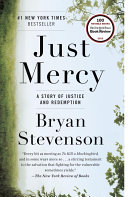
Just Mercy
A Story of Justice and Redemption
- Today we have the highest rate of incarceration in the world. The prison population has increased from 300,00 people in the early 1970s to 2.3 million people today. There are nearly six million people on probation or on parole. One in every fifteen people born in the United States since 2001 is expected to go to jail or prison; one in every three black male babies born this century is expected to be incarcerated.
- Spending on jails and prisons by state and federal governments has risen from $6.9 billion in 1980 to nearly $80 billion today. Private prison builders and prison service companies have spent millions of dollars to persuade state and local governments to create new crimes, impose harsher sentences, and keep more people locked up so they can earn more profits. Private profit has corrupted incentives to o\improve public safety, reduce the costs of mass incarceration, and most significantly, promote rehabilitation of the incarcerated.
- Each of us is more than the worst thing we've ever done
- A 2011 poll of Mississippi Republicans found that 46 percent support a legal ban on interracial marriage, 40 percent oppose such a ban, and 14 percent are undecided
- So defendants like Walter McMillian, even in counties that were 40 or 50 percent black, frequently found themselves staring at all-white juries, especially in death penalty cases. Then, in 1986, the Supreme Court ruled in Batson v. Kentucky that prosecutors could be challenged more directly about using peremptory strikes in a racially discriminatory manner, giving hope to black defendants -- and forcing prosecutors to find more creative ways to exclude black jurors.
- One of the country's least-discussed postwar problems is how frequently combat veterans bring the traumas of war back with them and are incarcerated after returning to their communities. By the mid-1980s, nearly 20 percent of the people in jails and prisons int he United States had served in the military.
- There was a shamefulness about the experience of Herbert's execution I couldn't shake. Everyone I saw at the prison seemed surrounded by a cloud of regret and remorse. The prison officials had pumped themselves up to carry out the execution with determination and resolve, but even they revealed extreme discomfort and some measure of shame. Maybe I was imagining it but it seemed that everyone recognized what was taking place was wrong. Abstractions about capital punishment were one thing, but the details of systematically killing someone who is not a threat are completely different.
- The study conducted for that case revealed that offenders in Georgia were elven times more likely to get the death penalty if the victim was white than if the victim was black. These findings were replicated in every other state where studies about race and the death penalty took place. In Alabama, even though 65 percent of all homicide victims were black, nearly 80 percent of the people on death row were there for crimes against victims who were white. Black defendant and white victim pairings increased the likelihood of a death sentence even more.
- Small even for his age, the five foot two, ninety-two-pound Stinney walked up to the chair with a Bible in his hand. He had to sit on the book when prison staff couldn't fit the electrodes to his small frame. Alone in the room, with no family or any people of color present, the terrified child sat in the oversized electric chair. He frantically searched the room for someone to help but saw only law enforcement personnel and reporters. The adult-sized mask slid off George's face when the first jolt of electricity struck his body.
- One of the first incarcerated women I ever met was a young mother who was serving a long prison sentence for writing checks to buy her three young children Christmas gifts without sufficient funds in her account. Like a character in a Victor Hugo novel, she tearfully explained her heartbreaking tale to me. I couldn't accept the truth of what she was saying until I checked her file and discovered that she had, in fat, been convicted and sentenced to over ten years in prison for writing five checks, including three of Toys“R”Us. None of the checks were for more than $150. She was not unique. Thousands of women have been sentenced to length terms in prison for writing bad checks or for minor property crimes that trigger mandatory minimum sentences.
- We emphasized the incongruity of not allowing children to smoke, drink, vote, drive without restrictions, give blood, buy guns, and a range of other behaviors because of their well-recognized lack of maturity and judgment while simultaneously treating some of the most at-risk, neglected, and impaired children exactly the same as full-grown adults in the criminal justice system.
- We're supposed to sentence people fairly after fully considering their life circumstances, but instead we exploit the inability of the poor to get the legal assistance they need -- all so we can kill them with less resistance.
- We've become so fearful and vengeful that we've thrown away children, discarded the disabled, and sanctioned the imprisonment of the sick and the weak -- not because they are a threat to public safety or beyond rehabilitation but because we think it makes us seem tough, less broken.